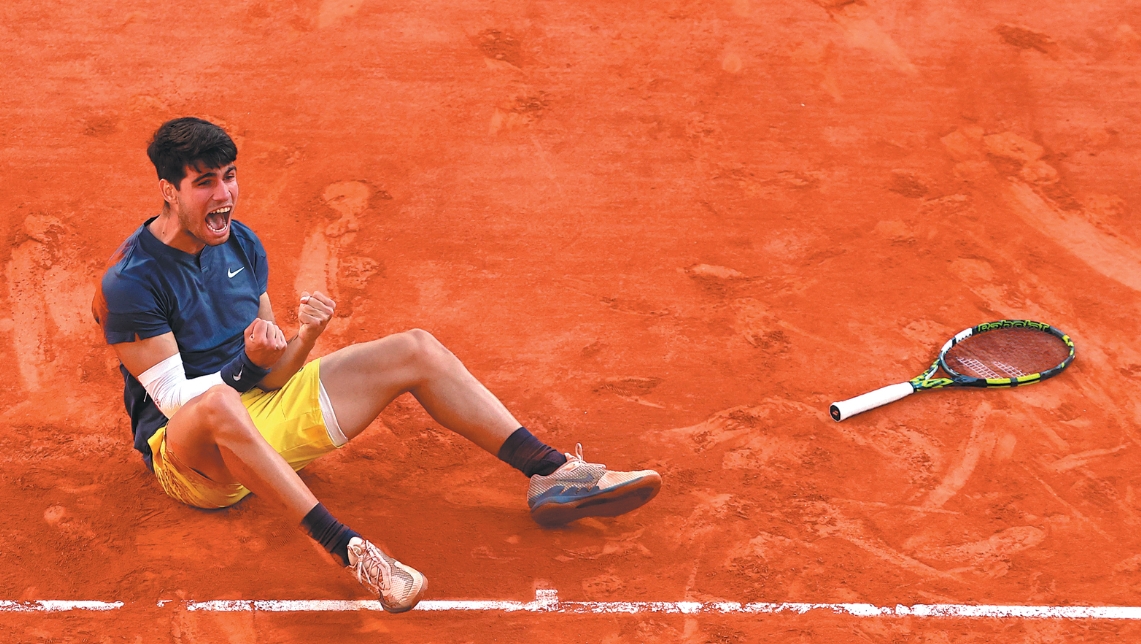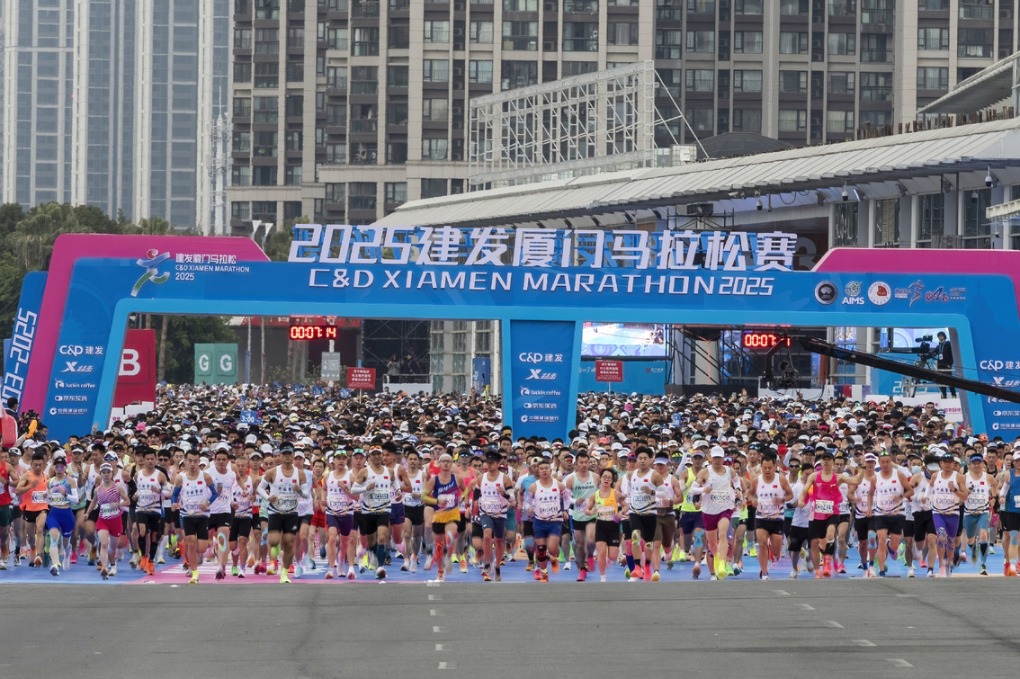Best of three
Alcaraz, 21, becomes youngest man to achieve a trifecta of Grand Slam titles on different surfaces


As Carlos Alcaraz began constructing his comeback against Alexander Zverev in Sunday's French Open final, there arrived the sort of magical shot the Spaniard is making a regular part of his varied repertoire.
It was a running, then sliding, down-the-line, untouchable forehand passing winner that Alcaraz celebrated by thrusting his right index finger overhead in a "No 1"sign, then throwing an uppercut while screaming, "Vamos!"
No, he is not ranked No 1 at the moment — the man he beat in the semifinals, Jannik Sinner, makes his debut at the top spot on Monday — but Alcaraz has been there before and, although a "2" will be beside his name next week, there is little doubt that he is as good as it gets in men's tennis right now. And, with his 6-3, 2-6, 5-7, 6-1, 6-2 victory over Zverev to claim a first championship at Roland Garros and third Grand Slam title in all, more accomplished than any man ever was at his age.
Alcaraz is a 21-year-old from Spain who grew up running home from school to watch on TV as countryman Rafael Nadal accumulated title after title at Roland Garros — a record 14. Now, he has eclipsed Nadal as the youngest man to collect major championships on all three surfaces. Nadal was about 18 months older when he did it.
"Different tournaments, different auras," Alcaraz said when asked to distinguish among his trio of trophies, "but I'm going to say: same feeling. I mean, winning a Grand Slam is always special."
The silverware from the clay-court major joins his trophies from triumphs on hard courts at the US Open in 2022, and on grass at Wimbledon in 2023. He is 3-0 in Slam finals.
"It's an amazing career already. You're already a Hall of Famer. You already achieved so much — and you're only 21 years old," Zverev told his victorious opponent after the match. "You're an incredible player. This is not the last time you're going to win this."
Zverev, a 27-year-old from Germany, exited the French Open in the semifinals at each of the past three tournaments, one of which, in 2022, saw him retire after tearing ankle ligaments during the second set against Nadal. Hours before Zverev's semifinal victory over Casper Ruud began on Friday, a Berlin district court announced that he reached an out-of-court settlement to end a trial stemming from an ex-girlfriend's accusation of assault during an argument in 2020.
On Sunday, against Alcaraz, Zverev faltered after surging in front by reeling off the last five games of the third set. Alcaraz's level dipped during that stretch, and he seemed distracted by a complaint over the condition of the clay, telling chair umpire Renaud Lichtenstein it was "unbelievable".
But, Alcaraz reset and ran away with the match, taking 12 of the last 15 games while being treated by a trainer at changeovers for some pain and cramping in his left leg.
"I know that when playing a fifth set, you have to give everything and you have to give your heart," Alcaraz said. "I mean, in those moments, it's where the top players play their best tennis."
No 3 and No 4 seeds, respectively, Alcaraz and Zverev were making their first appearance in a French Open final. Indeed, this was the first men's title match at Roland Garros since 2004 without at least one of the "Big Three" — Nadal, Novak Djokovic or Roger Federer.
Nadal, who is 38 and was limited by injuries over the last two seasons, lost to Zverev in the first round two weeks ago; Djokovic, 37, a three-time champion, withdrew before the quarterfinals with a knee injury that required surgery; Federer, 42, is retired.
There were some jitters at the outset. Zverev started with two double-faults — changing rackets after the second, as if the equipment were the culprit — and got broken. Alcaraz lost serve immediately, too.
Let's just say that they won't be putting those initial 10 minutes in the Louvre. Actually, a lot of the 4-hour, 19-minute match was patchy and littered with unforced errors.
Alcaraz, however, was at his best when it mattered the most — the last two sets.
"I lost focus, and, on my serve, I didn't get the power from my legs anymore, which is weird. Because normally I do not get tired. I don't cramp," Zverev said. "Against Carlos, it's a different intensity."
Just like he did against Sinner in the semifinal, Alcaraz overturned a deficit of two sets to one against Zverev, making him the first man to capture the French Open by doing that in each of the last two matches since Manolo Santana — also from Spain — in 1961.
Alcaraz showed off all of his skills: the drop shots, the artful half-volleys, the intimidating forehands delivered aggressively and accompanied by a loud grunt. His 27 forehand winners were 20 more than Zverev's total.
Not bad for a guy who arrived in Paris saying he was afraid to hit his forehand at full force because of a forearm injury, which had sidelined him for nearly all of May. He said Sunday that there were "a lot of doubts" entering the French Open, and that he was forced to limit his practice time — which is why he considers this victory the proudest moment of his still-nascent career.
In the fifth set, under constant pressure from Alcaraz, Zverev got broken to fall behind 2-1. The next game showed the grit and gumption that are already hallmarks of Alcaraz's playing style.
Zverev — who argued about one line call on a second serve by Alcaraz that the German said afterward was out according to an unofficial video review — would hold four break points. He failed to convert any. Alcaraz didn't let him, and wrapped up the game with a drop shot.
The crowd roared. Alcaraz held his left index finger to his ear while waving his racket. He broke again for 5-2, then served it out and dropped onto his back, caking his shirt with clay — just as Nadal often did after championship point.
Alcaraz first learned to play tennis on the rust-colored surface, although he says he prefers hard courts. The Spaniard says that he dreamed long ago of adding his own name to the list of Spanish men to win the event, including his coach, 2003 champion Juan Carlos Ferrero.
The red-and-yellow Spanish flags that became such an annual fixture at Court Philippe Chatrier in the era of Nadal were there again Sunday, this time for Alcaraz. The difference? The cries of "Ra-fa! Ra-fa!" were now "Car-los! Car-los!"
Agencies Via Xinhua
Most Popular
- Fallen soccer giants signal end of China's big-spending era
- Pistons tame Wolves despite Edwards' heroics
- City shows a bit more Pep with successive wins
- Arteta aghast at Brighton penalty as Gunners misfire
- A marathon year for Belgian amateur
- As life without Butler begins, Heat fails to ignite






























